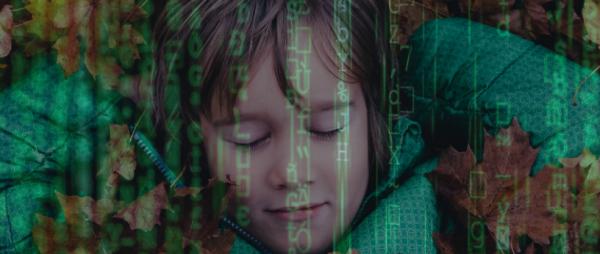Quick! Give your kids a permanent online IDENTITY!
Smartphones can wait. First things first, please.
I already explained why sharenting is bad, but not because you should worry too much about potential dates, admissions counselors and even abusers harming your children thanks to what they find about them online. You should worry more about something else.
Worry about datafication instead

<u><em><strong>CAPTION:</strong>
<a href="http://reillytop10.com/2018/12/15/the-datafication-of-children/" target="_blank">Image source: Datafication of Children</a>
</em></u>
The sources of bigger risks on social networks are not other human beings. Those are potential risks that are easy to manage. The problem are the networks themselves.
More than from paedophiles (much more), you must shield your kids from two other dangers. One is the next version of “Lewd and violent videos served up to toddlers by dedicated app for children”: that enough is a sufficient reason delay and dose responsibly children exposure to screens, and delay even more their ownership of smartphones, or any other “screen” connected to the Internet. Including, for the time being, the great majority of “smart” toys.
The other danger, which is the most certain and by far the biggest one, is that you cannot stop the social network from seeing and reusing as they please whatever you post as “private”. It is this that leads too many children to their “datafication”, that is: children profiled, scored and made ready for total future surveillance by their own parents leaving data traces for them, before they are even born.
Just do your best to reduce and delay datafication as much as possible, using the following story as inspiration.
“Active but private”
Years ago, before their baby was even born, her parents were perfectly aware of the dangers described in the previous paragraph. They understood perfectly well that algorithms would “analyze the people around their baby, the references made to them in posts, and over time will determine her most likely inner circle”.
So, they did something that I encourage every future parent to copy (albeit with the modifications I suggest below). They “created a digital trust fund”. In practice, they:
- decided to never post any photos or other personally identifying information about their daughter online (*)
- after choosing a few possible name for the baby, they used “brand registration services”. In plain English, this means that they “ran each (and their variants) through domain and keyword searches to see what [domain and social account names] were available” (including “if a Gmail address was open”) or if there already was negative online content associated that name
- After deciding the name, they registered all the corresponding web domains and social media user names (e.g. Mary.Example.com, Mary.Example.net, marythisisjustanexample@gmail.com, @maryexampledotcom on Twitter and Facebook and so on)
- planned to hand over the master password for all those accounts when the baby will be mature enough to use her wisely, including “start cashing in parts of her digital identity”
So, that baby was born with already valid accounts on all major social networks, a valid website name, and overall “brand protection” in place. This happened years ago, and as of today no content has ever been posted in any of those places: “All accounts are kept active but private”.
Great, but…
Are those recommendations complete? Are they excessive? And where do they lead us all in the long term?
The first point above is easy: just do it. Everywhere. There are no “good” or “bad” networks here. Not yet at least. Even if you still believed that Google “makes no evil”, for example, can you be sure that Facebook will buy Google and abuse of its data, just as it has done with Instagram and WhatsApp? Or that Uncle Greg will not repost somewhere else what you shared “privately” with him?
As far as registering domain names and social accounts names goes… I surely suggest to register the domain name, if you can. That is the closest thing to a worldwide-valid, permanent online identity we have today. And is also the one that is most likely to be still in use 13 years from now.
Accounts on social networks, instead… Nothing against doing that too, but many social networks of today will be likely be dead when your kids are old enough to wish they were there. Maybe. Just imagine how any 13-years old girl today would react at her father proudly handling her the password of the MySpace account reserved for her in 2006! Duh. If you want to do this, be prepared to keep doing it again for years, every time a new service becomes popular.
All hail the digital aristocracy

<u><em><strong>CAPTION:</strong>
<a href="https://www.smashwords.com/books/view/219510" target="_blank">Follow this link for the Commoner's Guide to Digital Aristocracy</a>
</em></u>
What is the “big picture”, long term impact of the recommendations above on society?
What that couple of parents did is laudable. Again, I advise to follow their example. But let’s all be aware that this:
- is another digital divide, between those who are already affluent and skilled enough to do all this stuff, and the overwhelming majority of those who aren’t, but would deserve the same protection for their childrens' privacy
- is another ECONOMIC divide: in case of disputes over johnsmithexample.com between two guys with the same name, who do you believe will own that domain eventually? The one who registered it first, even if he is on welfare, or the one who came later, but is the offspring of Silicon Valley executives? Would that be fair?
- will get worse over time. As years and generation pass, the only choice left for parents who want to give their chilren a unique web domain name as present will be to give them names too weird to imagine.
“I am Jon Snow the fifth…
“… of the Snows Dot Com. My family has called that URL home for ten generations now”.
Once upon a time, we had landed gentry. Nowadays, responsible digital parenting is giving birth to WebDomained Gentry.
Add to all this that parents smart enough to secure web domain names and create “digital trust funds” can also teach their kids how to hack online dating, and things start to get really interesting. In the wrong way.
Not sure how to take it. You?
(*) But readers soon found such photos of the baby online anyway. Which proves the parents' point, of course.
Who writes this, why, and how to help
I am Marco Fioretti, tech writer and aspiring polymath doing human-digital research and popularization.
I do it because YOUR civil rights and the quality of YOUR life depend every year more on how software is used AROUND you.
To this end, I have already shared more than a million words on this blog, without any paywall or user tracking, and am sharing the next million through a newsletter, also without any paywall.
The more direct support I get, the more I can continue to inform for free parents, teachers, decision makers, and everybody else who should know more stuff like this. You can support me with paid subscriptions to my newsletter, donations via PayPal (mfioretti@nexaima.net) or LiberaPay, or in any of the other ways listed here.THANKS for your support!